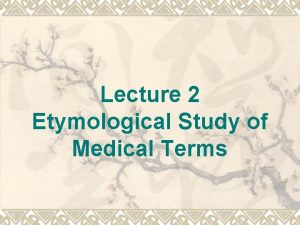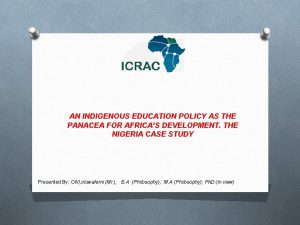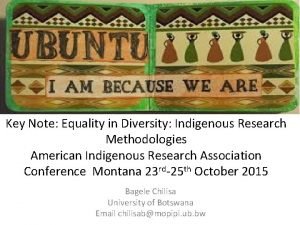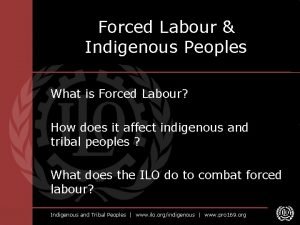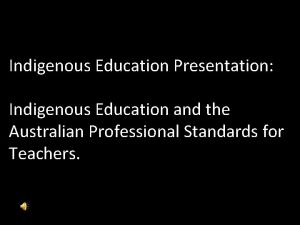AN INDIGENOUS EDUCATION POLICY AS THE PANACEA FOR










- Slides: 10

AN INDIGENOUS EDUCATION POLICY AS THE PANACEA FOR AFRICA’S DEVELOPMENT. THE NIGERIA CASE STUDY Presented By: ONI, oluwafemi (Mr. ), B. A (Philosophy); M. A (Philosophy); Ph. D (in view)

Education is the process by which any society through schools, colleges, universities and other institutions transmits heritage (its accumulated knowledge, values and skills) from one generation to another. Many countries in Africa were colonies of the imperialists until flag independence were granted to them. For instance, Nigeria was granted flag independence in 1960 while it became a Republic in 1963. Notwithstanding the divergent views held by scholars of History, it can be rightly argued that the contributions of the imperialists in the civilization process of many countries in Africa is an indelible milestone that propelled Africa’s countries march from a primordial and classically primitive antecedents into continental and global political relevance.

Albeit the aforesaid, the fact still remains that in terms of socio-technological developments, many countries in Africa are still lagging behind. The reasons for this underdevelopment are not far-fetched. Many of the inherited legacies left behind by the imperialists especially the educational curriculum has been the greatest undoing of many of these African countries. Many of the social vices like terrorism, religious violence, corruption etc. that we are witnessing today were uncommon during the pre-colonial Africa. Truth be told, Africa countries started getting it all wrong the moment it started seeing everything Western as the measure of standard of living/values. There is nothing African (indigenous) in the real sense of it. Everything now has the imprint of the Western ideas. Ordinary music that was supposed to promote Africa heritage now has the fusion of the Western imprints. Our clothing lines have lost its indigenous look, women now wear foreign hair wigs (Chinese wigs, Indian wigs, Malaysian wigs etc), our traditional religion has become fetish. Now we are now casting and binding African gods as the source of Africa’s impoverishments. We could travel all the way from Africa to Western countries for Halloween, carnivals, Holy Pilgrimages, etc but when it comes to promoting our own heritages we started tagging them as diabolical and fetish. Most countries refer to their mother tongues as ‘vernactular’, what a shame? The worst hit sector is the educational sector. There were these inscriptions at the entrance gate of a university in West Africa that “Destroying any nation does not require the use of atomic bomb or the use of long range missiles. It only requires lowering the quality of education and allowing cheating in the examinations by the students… Patients die at the hands of such doctors, building collapse at the hand of such engineers, money is lost at the hands of such economists and accountants, humanity dies at the hands of such religious scholars, justice is lost at the hands of such judges. The collapse of education is the collapse of the nation”.

Take for instance, in pre-colonial times, education in Nigeria, although imparted through informal means, was very rich and teachers were very dedicated. The feet of the elders formed the classrooms and pupils were initiated into life and living majorly through proverbs and wise sayings. Education during the pre-colonial period up to the 1970’s could be said to be organized. Unfortunately, the 1980’s till the present Nigeria has witnessed the desecration of education. These problems affecting the nation’s education sector are serious when we take into consideration the fact that government regulations guiding the education sector are mechanical guidelines, entirely lacking in a sound philosophical footing. School curriculum are lacking in content. The study of indigenous languages is gradually being phased out from the school curriculum. All the policy orientations affecting and regulating schooling are not properly organized or efficient in packaging the desired quality of education. Furthermore, in this age when the family, the basic and first social context for the child’s socialization and training, has also been dislocated as both husband wife enter into full-time occupations to make ends meet, the society now depends almost solely on the school as the social agent to prepare the child mentally, morally and socially to become a responsible citizen.

It is no gainsaying that the contemporary Nigerian environment therefore is thus ill-equipped to prepare children qualitatively to achieve the goal of education of search for an understanding of the meaning and the purpose of life, and discovering the right way to live. Already the nation has begun to witness the effect of this situation, which includes lowering of values and morals, and students’ involvement in violent and wicked acts besides meaningless intellectual orientation and ideas. Now, it has been realized that if a country must develop and become prosperous, it must have a vibrant entrepreneurial base through its youth population who are burning with imagination, passion, energy, creativity and intelligence. Entrepreneurship development is therefore a vital need for every country that is committed to economic growth and development. In Nigeria, entrepreneurship has become not only a growing but an urgent need. The nation needs to stimulate the entrepreneurial mindsets of its young people, encourage innovative business startups, and foster a culture that is friendlier to entrepreneurship and to the growth of small/medium -sized enterprises (SMEs) which has proved to be the pivot of growth in any nation. Entrepreneurship education has been discovered to be the pivot of most developed economies right from childhood to tertiary level. In the developed world, where kid/teen entrepreneurship is encouraged, success in life depends more on the skills that an individual possesses. Children are encouraged to pursue their passions at an early age. Even in schools, the development of children is of keen interest to teachers who discover their talents and encourage them to pursue and develop such talents. Today, musicians, artisans and footballers and the likes are some of the highest revenue earners in those countries.

Entrepreneurship education is by all means, a vital, crucial and commanding necessity for the social change that this nation earnestly needs; an endearing transformation in the direction of creating a prosperous, healthy and peaceful society. To realize this objective, our country needs to review its antecedents and with determination, muster strength to effect a revolution which begins with a determination to grow and build a new generation of Nigerian graduates thirsty for personal development, determined to earn themselves dignified and creditable livelihood, becoming employers and career entrepreneurs; thereby bringing the desired new lease and a decisive change to Nigeria. During the industrial age, the demand for employees grew. In response the government took over the task of mass education and adopted the Prussian system, upon which most Western school systems in the world are today placed. When you research the philosophy behind Prussian education you will find that the stated purpose was to produce soldiers and employees, people who would follow orders and do as they were told. Prussian system of education was a great system for mass production of employees. It was just a matter of training. Unfortunately, since independence, leaders, policy makers, educational and national planners have not significantly refocused our curriculum to produce a manpower that meets the country’s needs. Glaring examples of countries that shared the same colonial experience with Nigeria but have had their economies revolutionized include Malaysia and India. The consequence of lack of proper planning on the government’s side is the production of highly skilled, well-educated tertiary institution graduates who have no jobs even five to 10 years after leaving school. The problem is not only in the fact that the absorptive capacity of the economy is not growing as fast as the country is producing graduates. But there is also a disconnection between the skill gaps in the country and the endowments available. Today, we have thousands of graduates chasing very few jobs. More disturbing is that the quality and content of their training is non-responsive to national requirements.

People are trainable; they can be trained to either be employees or entrepreneurs. The reason there are more employees than entrepreneurs is simply because our schools train young people to become employees. That is why so many parents say to their children: go to school, so you can get a good job. I have yet to hear any parent say, go to school to become an entrepreneur. It is against this background that entrepreneurship education fills the missing gaps in our educational system that hitherto produced job seekers instead of prospective employers. The unemployment, and by extension, the poverty level within the country are consequences of the nation’s faulty planning. There is not only a need to bring out the latent entrepreneurial talents in our citizens of all ages, there is also the urgent need to arrest the ever growing population of unemployed and unemployable graduates by filling–in the missing link in their educational careers. Businesses are created by entrepreneurs: Men and women who dream up ideas for wealth creation and then translate those ideas into realities, taking calculated risks. When they dream and envision, they undertake the rigorous resources (human, material and financial) to create the machinery (Enterprise) to realise their dreams. Usually, they make investments to build the enterprise and then use the enterprise to deliver products and services that will fill existing needs, solve outstanding problems or create the desired value and in the process create wealth for themselves, their stakeholders including the community and the nation.

Nigeria is in need of virtually everything. Almost everything is in short supply. We are a nation of primary producers, a country crying for value addition and value creation. We export crude oil and import refined petroleum; export raw timber and import furniture; export hides and skin and import shoes and bags; rubber and import tyres. Water, water everywhere and yet there is none to drink! Refuse and garbage everywhere and we cannot generate electricity nor harness compost manure, sunshine all year round and we cannot harness electricity, natural gas everywhere and we import fertilizers. Are entrepreneurs born or made? I agree that there are some people who seem to have a natural proclivity to run with business ideas and seem to always want to start a new endeavour. I also know that certain groups of people seem to exhibit entrepreneurial tendencies more than other groups. The lgbos of South Eastern Nigeria, for example, are noted as more entrepreneurial than most. The ljebus, the Ijeshas and the Ogbomosho as well as Ejigbo people of the South-West and the Kano people of Northern Nigeria seem to share this ’group’ entrepreneurial spirit. But I do not think this is genetically derived, rather these tendencies may have evolved over time as a reaction from socioeconomic circumstances and other cultural traits passed from generation to generation. Permit me to say that the present crops of graduates are knowledgeable in their own fields but lack the entrepreneurial wherewithal to translate such knowledge to financial gains. This country is so crazy about educational qualifications that the present generations of graduates are nothing but certificated illiterates. The emergence of entrepreneurial minds capable of creating, growing and leading innovative and productive organizations in line with modern thinking is a critical and urgent challenge for national development in our beleaguered economy.

There is the need for university administrators to conduct regular reviews of their entrepreneurship courses to make graduates imbibe the spirit of enterprise. Universities should not only focus on theoretical aspect of entrepreneurship but should reach out to their alumni associations with a view to attracting successful entrepreneurs in their rank and file to take the students through the practical aspects of becoming successful entrepreneurs. Universities should prepare students for the world of market. Teaching theoretical foundation of becoming successful entrepreneurs in our universities is good and very important. It will help the students to understand the concept being taught. But becoming successful as an entrepreneur is more than theory and that is why we need to look into the methodology being used in our universities. Rather than just teaching theory, successful alumni of various universities should be engaged and allowed to take the students practical aspect of imbibing the entrepreneurial mindset. And that is why there is the need for constantly nurturing engagement between the private sector and our universities. O

I have argued at different occasions that government should stop fighting insurgents with physical weapons. Take it or leave it, the war against insurgents is war against an ideology that has been taught our brothers and sisters in the north as the acceptable way of life. The Boko Haram insurgents are educated in the real sense of it but they are educated to hate books. Funny enough, they are not sufficiently educated about even their religion, to know that some of the greatest philosophers came from that religion. Some of the greatest mathematicians were, the pioneers, Muslims; Islamic scholars. These insurgents have been taught on monorail and this is just one-track mind. So they need to be educated about their own history and their own culture. Inasmuch as I approved of the attempt to create the so called ‘Almajiri Schools’, I think it is of paramount importance that the content and the method of teaching is supervised and control. You don’t fight an ideology with guns. One needs superior ideology to fight an evil ideology. Succinctly put, ideologies are patterned clusters of normatively imbued ideas and concepts, including particular representations of power relations. These conceptual maps help people navigate the complexity of their political universe and carry claims to social truth. Ideology, especially the one that has grown into dogmas, always paves the way towards atrocity. We should however take cognizance of the fact that it is a huge mistake to become married to an ideology, especially when the ideology is not one that has been really thought through. Ideology is a man-made format of how the world ought to work. However, literacy and ideology are inseparable. Literacy helps to thwart intolerance, challenge dogma, and reinforce our common humanity while ideology does the opposite.


